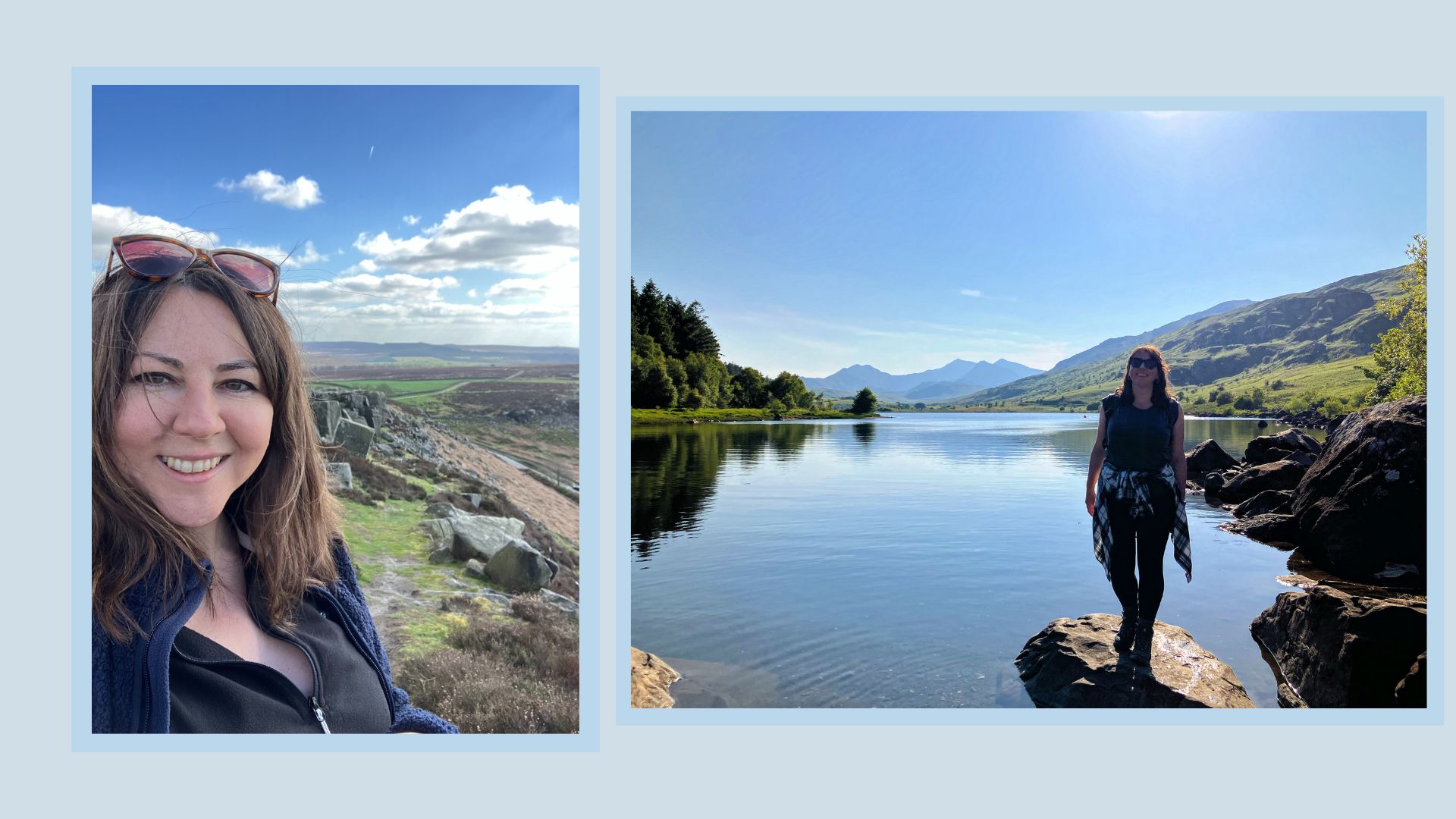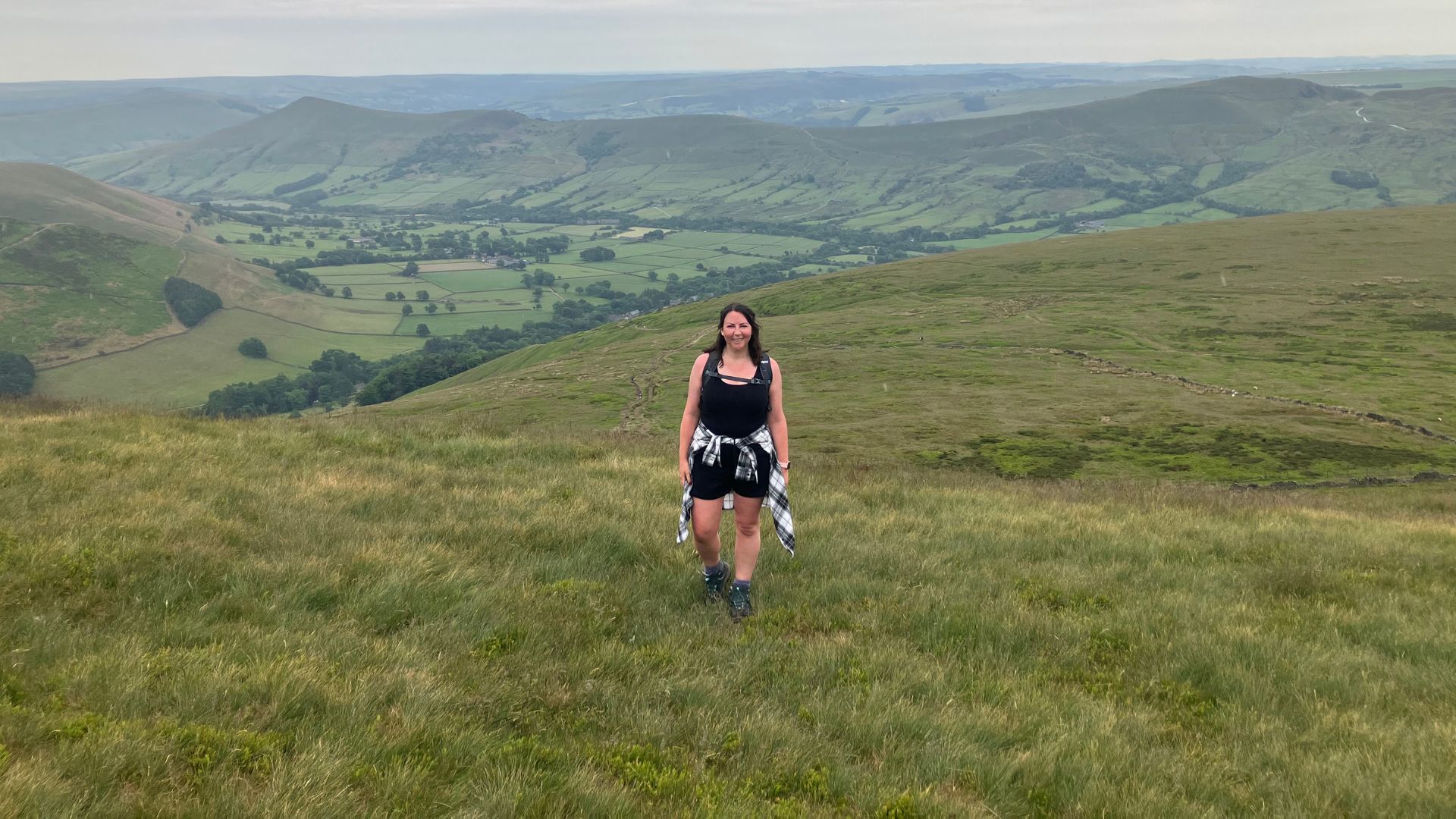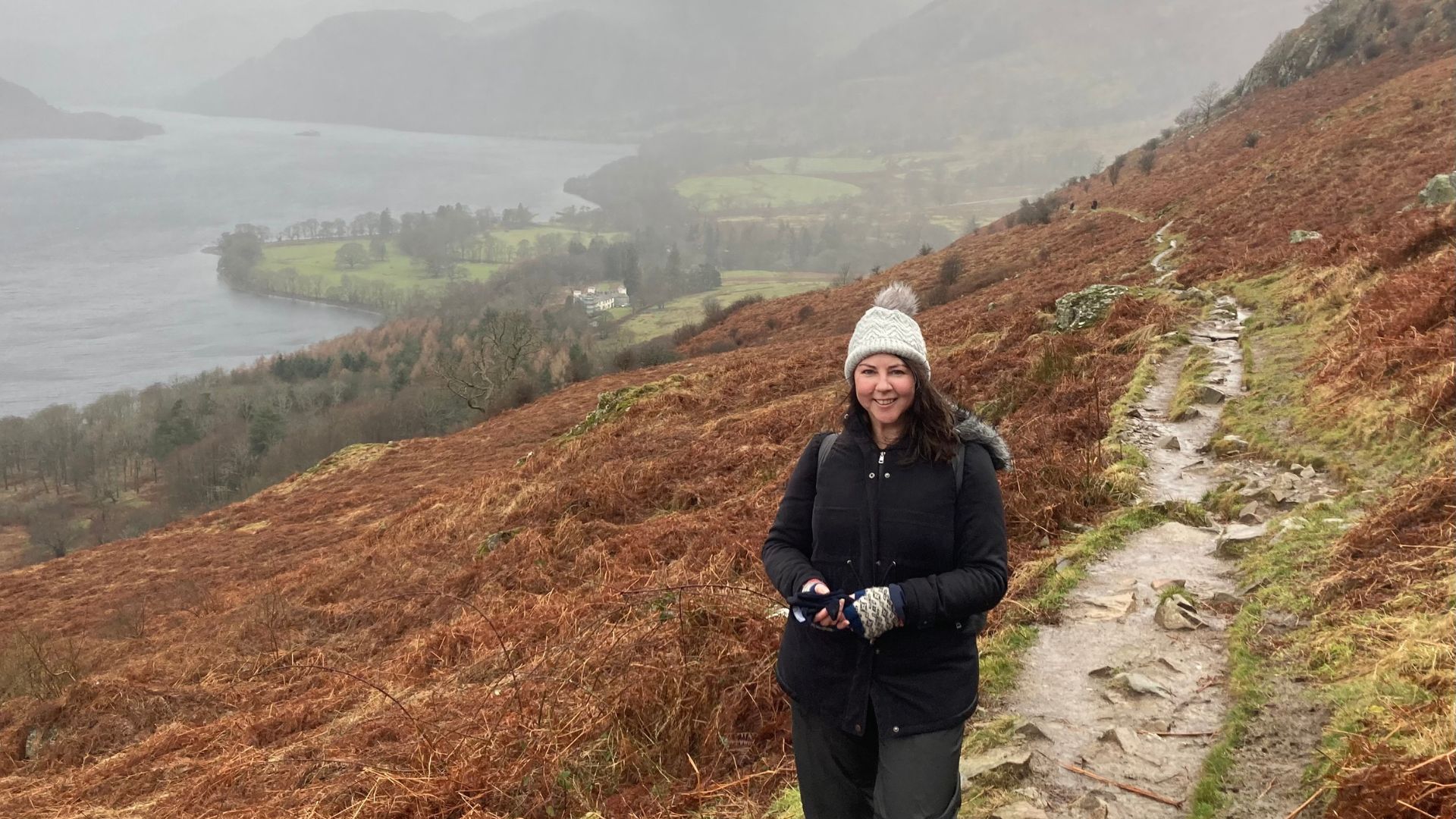
It's not as if I had always set out to become a keen hiker, but now I can’t envision life without my weekly walks. Hiking has been transformative for me physically and mentally, but that should be no surprise given the two are intertwined. When you feel better emotionally, you make healthier decisions, which is why I find myself 14 pounds lighter than at the start of the year.
Weight loss is a welcome result, but it's just one of the many benefits of hiking and not the reason I took up the activity. Although I have been sporadically hiking for almost five years, it was the conscious desire to shake things up at the start of this year that made the decision for me. My birthday falls two days after New Year - two occasions that naturally prompt a period of self-reflection. At 42, I realized I was in a rut and change was needed, including my approach to fitness.
It's why I promptly cancelled my gym membership. I had come to dread the spin classes (too loud and frenetic), my dodgy knees were preventing me from enjoying body pump classes, and ultimately, I never experienced the transformation I was waiting for expectantly.
Hiking seemed the perfect step to take. It is free, for one, and it could provide the space and quiet I was craving and allow me to move at my own pace. So, armed with my Fitbit, I set out with the intention of hitting 10,000 steps a day as regularly as I could - a tangible goal I reasoned. For me, this included a hike with a minimum of eight kilometres at least once a week that incorporated different types of terrain - and, I'm pleased to say, I have kept to my goal for the last seven months.
For me, hiking is about carving out time to calm my mind by distancing myself from the thought of deadlines and daily stresses, walking as a workout and burning calories while doing something enjoyable, and literally stretching my legs (as a result, my knees no longer play up). But that is just for starters - there are many benefits of hiking to be had from pulling on your pick of the best walking shoes for both body and mind.
Benefits of hiking
1. Hiking improves heart health
"With regards to cardiovascular fitness, hiking is an excellent activity to get your heart pumping. [One of the top benefits of hiking is that it can] strengthen your heart, lower blood pressure, and reduce the risk of heart disease," says Dr Sam Wild, a general practitioner. It can also decrease cholesterol and help prevent diabetes, she says, which is welcome news to anyone but especially if you're over 40. Personally, I really enjoy hikes that incorporate uphill climbs, but it is important to take your time and not put undue pressure on yourself.
“Start with easier trails, especially if you are new to physical activity,” advises Wild, who is also the clinical lead for women’s health at Bupa Global & UK. “Gradually increase the difficulty and duration of your hikes as you build strength and confidence.”
2. It strengthens your muscles
I can vouch that hiking is a great way to strengthen your muscles, especially your glutes and quads. My lower body in particular is feeling firmer these days, but it's not only the visual difference I have noticed: my physical capabilities are improving, too. I am climbing higher and walking further (up to 16 kilometres to date) as I grow in strength.
“Hiking engages various muscle groups, including the legs, core, and upper body,” says Wild, who suggests incorporating some strength training alongside hiking to further strengthen muscles. “Consider exercises that target the major muscle groups used during hiking, including legs, glutes, core, and back. Squats, lunges, step-ups, deadlifts, and planks can be particularly beneficial.”
3. Hiking increases bone strength
It is not only your heart and muscle health that improves through hiking, the benefits of walking can literally spread to your bones. “By challenging your balance and engaging your muscles, hiking improves your bone tissue, encouraging your bones to become denser over time,” says Wild. This is particularly key as we age since it helps to reduce the risk of osteoporosis and improves your balance. As a result, not only are you at less risk of falling, but if you did fall, bones can be less likely to fracture.
“Remember, you don’t have to travel a long distance in order to hike,” she adds. “There are plenty of opportunities to hike in cities and urban areas as well. Just taking those initial steps to get out in any way can make a big difference.”

4. It improves mental wellbeing
I believe it is impossible to feel worse after a hike. If anything, it's when you don’t feel in the mood that you will find it most beneficial. By the time you return, you have typically forgotten what you were stressed about or gained perspective on a situation, allowing you to think clearer in your personal and professional life.
Psychologist Dr Meg Arroll, author of Tiny Traumas: When You Don’t Know What’s Wrong, But Nothing Feels Quite Right, explains how:
5. Hiking is restorative
“People who spend time in nature doing activities such as hiking demonstrate greater mindfulness and overall psychological wellbeing," says Arroll, reminding us that many benefits of hiking come with calmer walking activities too, such as soft hiking and walking meditation. "This can be explained by the attention restoration theory (ART), in which individuals are seen to improve focus and mental health by resting directed attention."
With demanding jobs, we often don't give our brains time to rest, she says, resulting in the inability to concentrate and complete tasks. "When hiking, we can let our minds wander and attention become undirected which is restorative thereby improving cognitive performance.”
6. Hiking influences brain function
The impact of hiking on our brains has been noted many times in different research studies, as a review by Prescott College shows. "This includes decreased stress levels, a deactivated sympathetic nervous system, and a strengthened immune system," the psychologist points out. "All these findings influence brain functioning and allow for a mindset shift."
She says, "For example, when stress levels are high and cortisol is pumping around the body, it's very hard to gain a wider perspective as our brains innately focus on perceived threats in order to keep us safe. The physical and mental shifts interact dynamically, resulting in obvious changes to how we think and feel."
7. Hiking helps develop self-acceptance
From personal experience, I can tell you that by the time you have returned from a hike, you will typically have forgotten what you were so stressed about at the start of it or gained perspective on a situation, so it no longer feels overwhelming.
Not only that, hiking can help you be more confident in your own capabilities. Countless times, I have muttered to myself that I can’t make it up a mountain or hill, but for the most part, I have persevered and that feeling when I get to the top is addictively satisfying. It's a feeling you will want to replicate in other areas of your life when that voice in your head says you can’t do something.
This is also a benefit backed up by science, Arroll points out. "One fascinating study by Elmi Karbordi University that sampled midlife women in Iran for a 'green walking program' showed increases in reports of personal growth, positive relations with others, self-acceptance, and sense of purpose in life [linked to hiking]," she says.
"And it's never too late to start. A study among older adults by the University of Alberta in Canada found hiking to be associated with a positive view of ageing, providing a sense of control over the body and lessening dependence on medication, increased levels of physical activity and camaraderie."

Can you get in shape just by hiking?
“There are a few factors which can determine how quickly you start seeing results from hiking, including your starting fitness level, hiking intensity, frequency, and duration," says Wild. "Generally, it's important to be patient and approach hiking as a long-term commitment to your health and wellbeing."
Personally, I think it's entirely possible to get in shape by hiking alone. I feel fitter now than when I was going to the gym, my clothes fit better, and I have more energy than I did a year ago. Of course, the 14-pound weight loss isn’t solely due to the fact I am moving more but also the knock-on effect it has. I am making better decisions when I am not hiking. I feel more positive generally so I am not reaching for unhealthy snacks to perk myself up, and as I am less anxious, I am sleeping better. It's the ripple effect that's so impactful.
But this isn't too surprising, says Wild, since those who put in a consistent effort and take on new walking challenges can start to see the benefits of hiking within just a few weeks. "These early changes may include increased energy levels, enhanced mood, and a sense of accomplishment. Over time, you can expect to see further improvements in fitness, muscle strength, endurance, and weight management.”
At the moment, hiking is my sole form of exercise, but per Wild's advice, I do want to resume body pump classes, a form of weightlifting, which I used to enjoy before my knees made it too uncomfortable. Now hiking has eased the pain, it's a possibility once again.
“Alongside lower body exercises, such as squats, it is important to incorporate upper body exercises to provide a more balanced workout, build overall strength and improve posture and stability,” Wild says.
“Push-ups, shoulder presses, rowing exercises, arm curls, and plank variations are all examples of engaging upper body muscles, [which are also in use when hiking]. It's important to note that strength training should be balanced with proper rest and recovery, as well as gradually increasing intensity and load to avoid injury.”
Is hiking a better workout than running?
Back in the mists of time (well, 2006), I completed my one and only marathon. In 2023, the thought of running for more than a minute doesn’t feel feasible. Hiking just seems more accessible than running, or perhaps I should say, less daunting.
“Hiking and running are both beneficial to health and wellbeing but for individuals aged 40 and above, it often provides several advantages. Hiking is a much lower-impact activity when compared to running and as such, carries a lower risk of injuries such as stress fractures or shin splints that can be associated with running,” says the personal trainer, flagging the key differences between walking vs running for our health.
“What’s more, while both activities engage the leg muscles, hiking often involves more diverse movements and engages a broader range of muscle groups, including the core and upper body. This can contribute to improved overall strength and balance.”
Dr Arroll also refers to a study that found hikers burned more calories than runners or walkers “because they didn't view this activity as formal exercise but instead focused on sightseeing, socialising, and experiencing nature. Indeed, hikers spent longer periods of time outside than they would have if exercising in an indoor environment such as a gym.”
This, and all the other benefits of hiking I've found over the last five years, is why I will be reaching for my walking boots for the foreseeable.







